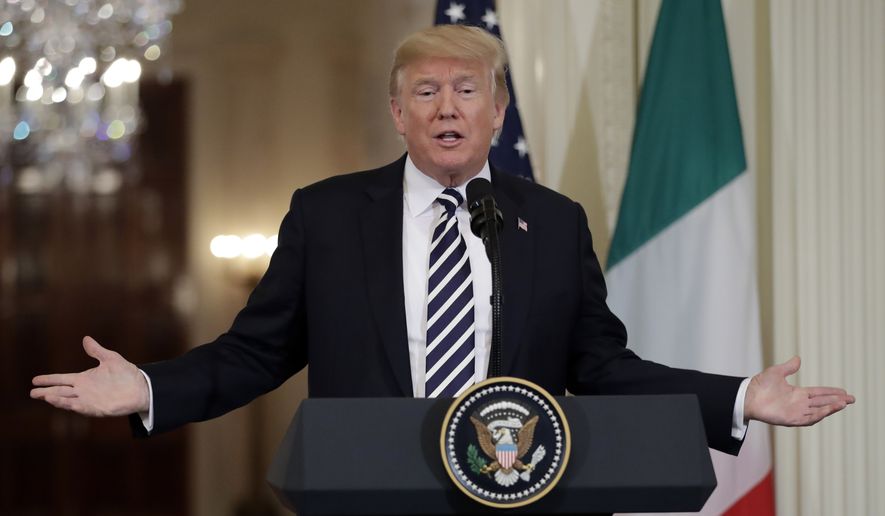President Trump said Monday that he’s ready to meet Iran’s president without preconditions to discuss how to improve ties, despite a recent exchange of threats with the leader of the Islamist regime.
“If they want to meet, I’ll meet any time they want,” Mr. Trump said. “No preconditions. I believe in meetings.”
The president’s comments, at a White House press conference with Italy’s prime minister, were a significant change in tone from the warning he issued to Iranian President Hassan Rouhani on social media on July 22. At the time, Mr. Trump threatened Mr. Rouhani in an all-caps tweet, “Never, ever threaten the United States again or you will suffer consequences the likes of which few throughout history have ever suffered before.”
He had been responding to Mr. Rouhani’s claim in a speech that the U.S. was risking “the mother of all wars” with Iran after pulling out of the Obama administration’s 2015 nuclear deal and restoring sanctions.
Secretary of State Mike Pompeo echoed Mr. Trump’s comments later, saying on CNBC that Mr. Trump “wants to meet with folks to solve problems.” But the president’s top diplomat did place some conditions on talks with Tehran.
“If the Iranians demonstrate a commitment to make fundamental changes in how they treat their own people, reduce their malign behavior, can agree that it’s worthwhile to enter into a nuclear agreement that actually prevents proliferation,” cautioned Mr. Pompeo, “then the president said he’s prepared to sit down and have the conversation with them.”
At the press conference, Mr. Trump did say he wanted to go into any meeting with an expectation that he could “work something out that’s meaningful.”
“I do not know if they are ready,” Mr. Trump added.
In May, Mr. Pompeo called on Iran to change its belligerent behavior, including a demand that Iran admit to the military purposes of its nuclear program, end its support of terrorist groups such as Hezbollah and Hamas, and withdraw all of its forces from Syria.
“The list is pretty long,” Mr. Pompeo said at the time. “We didn’t create the list. They did.”
Mr. Rouhani called those demands “not acceptable.” Iran has said it also rejected efforts by the Trump administration that engineer a meeting between the two presidents last fall on the sidelines of the U.N. General Assembly in New York.
Since pulling out of the nuclear deal, the administration wants any new agreement to impose limits on Iran’s ballistic missile program and to curtail its aggression in Syria, Iraq and Yemen.
Mr. Trump made the offer despite criticism from Republicans at his Democratic predecessor, Barack Obama, for suggesting a meeting with Iran without preconditions during the 2008 presidential campaign. But Mr. Trump noted that he also has been criticized for meeting with North Korean leader Kim Jong-un in Singapore and Russian President Vladimir Putin in Finland, and he portrayed both as successful.
Richard N. Haass, president of the Council on Foreign Relations, tweeted in response, “It is one thing to meet w/o preconditions, something else to meet w/o careful preparations and a notetaker. Both the Singapore and Helsinki summits disappointed and arguably caused more problems than they solved; we do not want or need that with Iran.”
But Mr. Trump said such meetings are especially important when war or famine hang in the balance. Iran’s economy also has been deteriorating rapidly, with its currency plummeting in value.
“I don’t do that from strength or from weakness. I think it is the appropriate thing to do,” he said.
Trita Parsi, president of the National Iranian American Council, said the president’s offer rang hollow after his threat a week ago.
“If this is Trump’s idea of pivoting to diplomacy, it stands little chance of success,” Mr. Parsi said. “If Trump is truly genuine about reaching a ’better deal’ with Iran, then there is a proven path with Iran that works. And it entails Trump offering Iran concessions and not just threats and demands.”
Since leaving the nuclear deal, the administration has moved to reinstate sanctions on Tehran in two steps. Some to be applied in August will hit autos and key metals, while other sanctions will be reinstated in November, targeting Iran’s oil industry and its Central Bank.
The remaining parties to the Iran nuclear deal — Russia, France, China, Britain and Germany — are still committed to the agreement.
• Dave Boyer can be reached at dboyer@washingtontimes.com.
• S.A. Miller can be reached at smiller@washingtontimes.com.




Please read our comment policy before commenting.